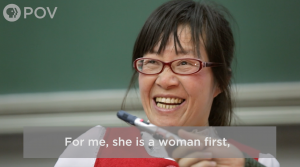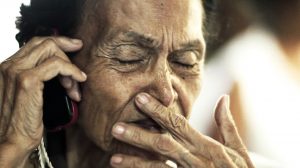Still Tomorrow: Filmmaker Statement
This film shows distinct female perspectives and centers on women’s issues. The main theme is how a woman gains economic and personal independence and then struggles for freedom in love and in life.
Most of Yu Xiuhua’s poems are about love. For more than twenty years, she has pursued love but never succeeded in finding it. There is no love between her and her husband. For Yu Xiuhua, living a life without love is unacceptable, and she unleashes her emotions in her poems. After her poem collections are published, she gains financial independence and readies herself for divorce. In different social settings, Yu Xiuhua meets many male writers and journalists. She develops feelings for several different people, and she is unwavering in her commitment never to give up chasing love—indeed, she becomes more determined than ever to divorce her husband.
In China, a woman asking for a divorce is often seen as immoral. Yu Xiuhua faces three obstacles to divorce. The first comes from her husband. Out of pride, he does not agree to a divorce at first. It is not until Yu Xiuhua agrees to give him money that he feels duly respected and compensated. The second comes from her mother. This is a bigger conflict, involving the gap between women of different generations. Yu Xiuhua’s mother is a traditional rural woman. She believes that a woman needs to have a marriage, and that having a family is more important than having true love. Yu Xiuhua’s mother has always tried to make plans for her and influence her, yet Yu Xiuhua resists these efforts. However, she is emotionally close to her mother. When her mother is diagnosed with cancer, Yu Xiuhua finds herself in a dilemma. The third obstacle to divorce takes the form of social pressure. In China, a woman may get a bad reputation if she ditches her husband after becoming famous.
Yu Xiuhua also faces other difficult situations. Before Yu Xiuhua became well known, she lived an Emily Dickinson-style life, writing poems in isolation in the countryside. She shares Dickinson’s loneliness and fragility. Yu Xiuhua is also similar to Virginia Woolf, both emotionally and in life experience. Woolf had serious mental illness, and Yu is often in agony over her failed pursuit of love. Pain plays an important role in the work of these women writers: the more pain they feel, the more touching their writing becomes.
Yu Xiuhua inspired a new wave of poetry reading in China. Her readers are mostly women. She gives Chinese women, buried under an onslaught of daily chores, new hope. She has cerebral palsy, but she doesn’t let that stop her from creating powerful literature.
This film also shows the difficulties and challenges faced by a disabled and sensitive woman. Yu Xiuhua hates her disabilities. Cerebral palsy makes it difficult for her to move around and affects her appearance. Yu Xiuhua once said, “I feel my voice cannot adequately deliver my poems; my soul is trapped by my body.” She writes poems to break through the confines of her body, to conquer physical deficiencies with literary beauty and to fulfill bodily yearnings with poetic desires and emotions. Yu Xiuhua’s struggles and pursuit of love are tragic. Even after divorce, she cannot find emotional and bodily fulfillment because of her disabilities. As she writes, “Is it true that there is still tomorrow? / What a pity that there is still tomorrow.”
In addition, the film shows the power of new media in modern China, where a person who appears on the Internet can become well-known overnight. For a time, Yu Xiuhua’s name is the subject of more online searches than the names of movie stars like Daniel Craig. New media changes her fate. Yu Xiuhua says it is like a dream.
Although I am a man, I developed a very good relation with Yu Xiuhua during filming. She sees me as a close friend, since I very carefully read and try to understand her and her poems. She let me film many private moments and was willing to open up to me. Also, women members of my team helped me build female perspectives into the film.
— Jian Fan
 Still Tomorrow: Film Update
Still Tomorrow: Film Update  The Apology: Filmmaker Statement
The Apology: Filmmaker Statement  Featured Event: 'QUEST' film screening with Company One and ZUMIX
Featured Event: 'QUEST' film screening with Company One and ZUMIX  Featured Event: 'Whose Streets?' Screening and Discussion at St. Louis' Public Media Commons
Featured Event: 'Whose Streets?' Screening and Discussion at St. Louis' Public Media Commons